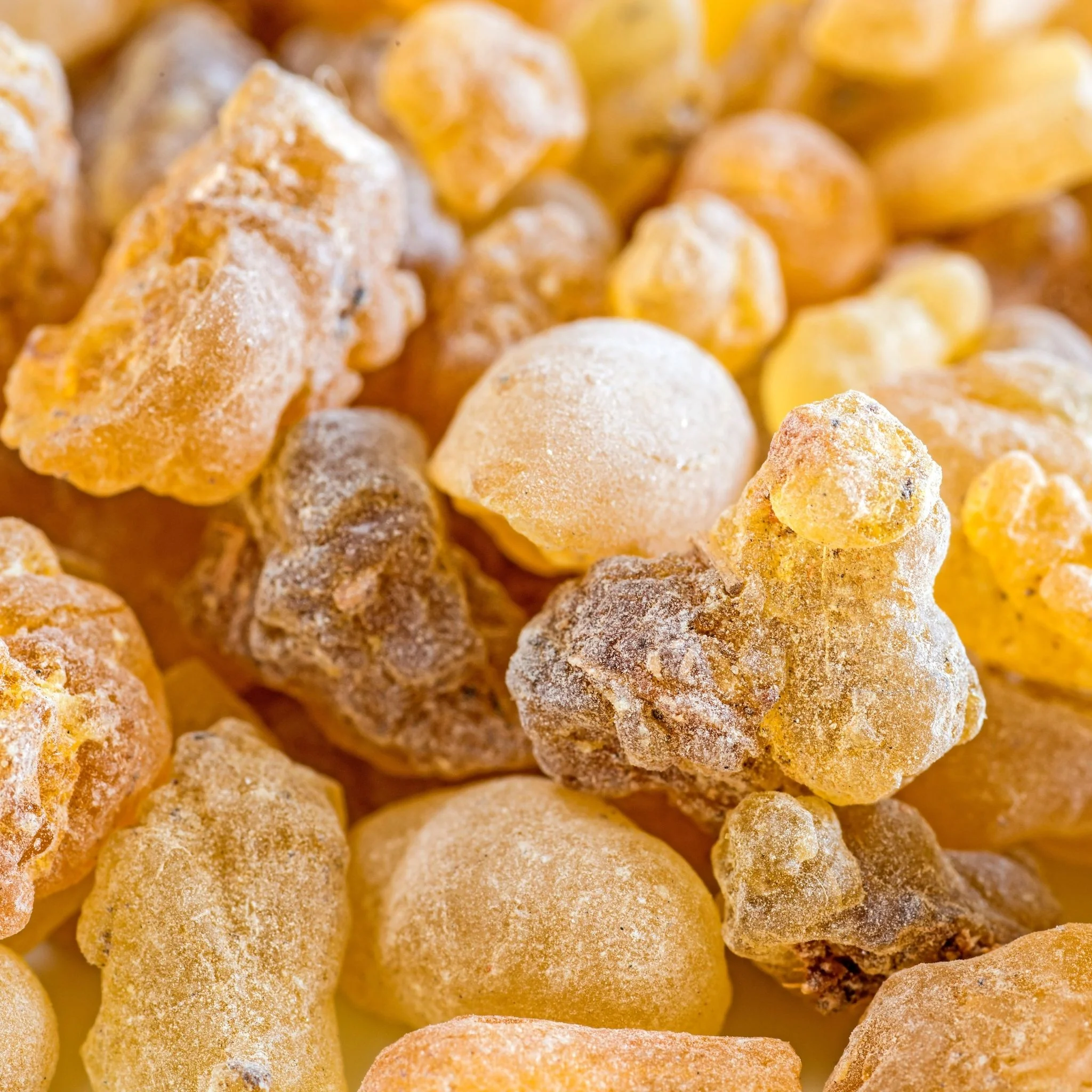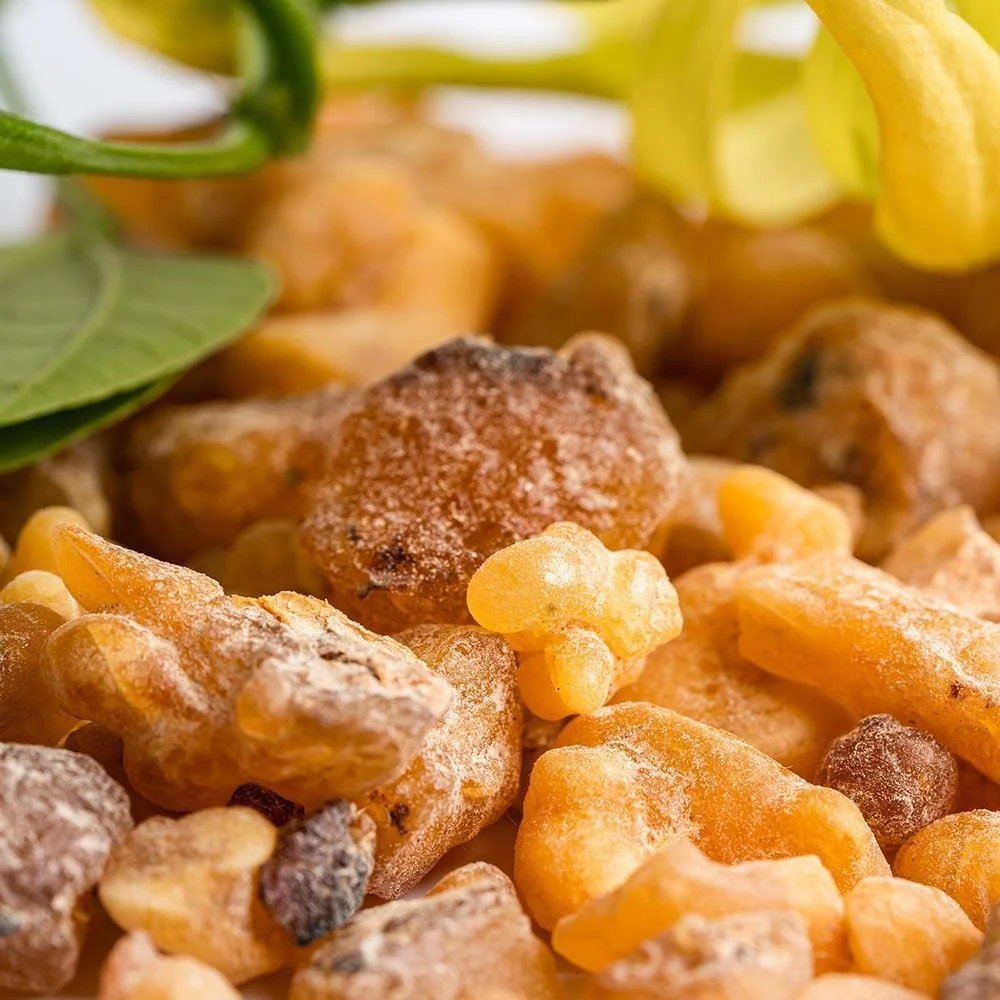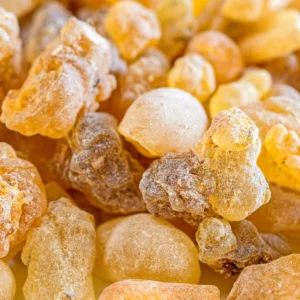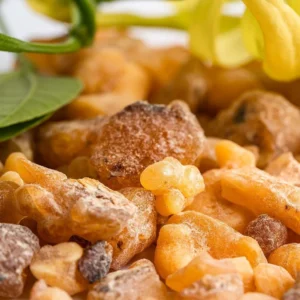No products in the cart.
Frankincense, also known as olibanum or Indian frankincense (derived from Boswellia serrata), is an aromatic resin obtained from trees of the genus Boswellia, particularly Boswellia serrata. These trees are native to dry, mountainous regions of India, North Africa, and the Middle East. The name “frankincense” originates from the Old French term “franc encens,” meaning “high-quality incense.”
Historically, frankincense has been highly valued for millennia across various cultures and religions. It was a significant commodity in ancient trade routes, often considered as precious as gold. Egyptians used it in embalming and perfumes, while it held spiritual significance in various religious ceremonies, including those of ancient Hebrews, Christians (as one of the gifts of the Magi), and Muslims. In traditional medicine systems like Ayurveda and traditional Chinese medicine, frankincense has been employed for its therapeutic properties for centuries.
The resin is harvested by making incisions in the bark of the Boswellia tree, allowing a milky white to yellowish gum-resin to exude. This resin then hardens into tear-shaped droplets, which are collected. The aroma of frankincense is typically described as woody, spicy, and slightly fruity, often with a balsamic undertone.
Uses of Frankincense:
Frankincense has a wide range of applications, including:
Traditional and Religious Uses:
- Incense: The most well-known use is as incense in religious ceremonies (Catholic, Eastern Orthodox, Islamic, Hindu) and spiritual practices worldwide. Its fragrant smoke is believed to purify spaces, promote meditation, and connect with the divine.
- Rituals: Historically used in various cultural rituals for purification, blessings, and offerings.
Aromatherapy and Well-being:
- Essential Oil: Frankincense essential oil, produced by steam distillation of the resin, is popular in aromatherapy. It is used in diffusers, topical applications (diluted with a carrier oil), and baths to promote relaxation, reduce stress and anxiety, and uplift mood.
- Meditation and Mindfulness: Its aroma is believed to deepen meditative states and enhance focus.
Skincare:
- Anti-aging: Frankincense oil is used in skincare for its potential to improve skin elasticity, reduce the appearance of wrinkles, fine lines, and age spots.
- Wound Healing and Scar Reduction: Traditionally used to promote wound healing and reduce the appearance of scars.
- Acne and Blemishes: Some believe it can help with acne due to its potential anti-inflammatory and antiseptic properties, although this is not universally effective and can cause irritation in some.
- Skin Tone Improvement: May help to even out skin tone and reduce redness.
Traditional Medicine:
- Anti-inflammatory: Boswellic acids, key compounds in frankincense resin, have demonstrated significant anti-inflammatory properties in research. This makes it potentially useful for conditions like arthritis and inflammatory bowel disease.
- Pain Relief: Traditionally used to alleviate pain associated with inflammation and other conditions.
- Respiratory Health: May help to ease symptoms of asthma and bronchitis by reducing inflammation in the airways.
- Oral Health: Its antiseptic properties have been traditionally used to promote oral hygiene and combat bad breath, gingivitis, and mouth sores.
- Digestive Health: Traditionally used to aid digestion and relieve symptoms of indigestion.
- Immune Support: Some studies suggest frankincense may have immunostimulant properties.
Other Uses:
- Perfumery: Frankincense essential oil is a valuable ingredient in the perfume industry, providing a warm, resinous base note.
- Natural Cleaning: Its antiseptic properties make it a potential ingredient in natural household cleaners.
Advantages of Frankincense:
- Potent Anti-inflammatory Properties: Boswellic acids are well-researched for their ability to inhibit inflammatory pathways in the body.
- Potential Pain Relief: May offer a natural alternative or adjunct for pain management.
- Skincare Benefits: Can contribute to healthier, more youthful-looking skin.
- Stress and Anxiety Reduction: Its aroma has calming and grounding effects.
- Potential for Respiratory Support: May help alleviate asthma symptoms.
- Antiseptic and Antimicrobial Properties: Can help fight germs and bacteria.
- Rich Historical and Cultural Significance: Its long history of use underscores its perceived value across different societies.
- Relatively Safe for Topical and Aromatherapeutic Use: When properly diluted, it generally has mild side effects.
Disadvantages of Frankincense:
- Potential Skin Irritation: Undiluted essential oil can cause skin irritation, redness, and allergic reactions in some individuals. Proper dilution with a carrier oil is crucial.
- Gastrointestinal Issues (Oral Intake): Oral consumption of frankincense extracts in high doses may cause stomach pain, nausea, and diarrhea in some people.
- Drug Interactions: Frankincense may interact with certain medications, particularly those metabolized by the liver. It’s important to consult a healthcare professional if you are taking other medications.
- Safety During Pregnancy and Breastfeeding: There is limited research on the safety of using frankincense in large amounts during pregnancy and breastfeeding. It is generally advised to avoid use or consult a doctor.
- Quality and Purity Concerns: The quality and purity of frankincense essential oil and resin can vary significantly depending on the source and processing methods. It’s essential to purchase from reputable suppliers.
- Sustainability Concerns: Overharvesting of Boswellia trees in some regions poses a threat to their populations and the long-term availability of frankincense. Sustainable harvesting practices are crucial.
- Limited High-Quality Human Research: While many potential benefits are suggested by traditional use and in vitro studies, more rigorous human clinical trials are needed to confirm the efficacy of frankincense for various health conditions.
- Misinformation and Overstated Claims: The internet contains many exaggerated claims about frankincense’s ability to cure serious diseases like cancer. It is crucial to rely on credible scientific sources and consult healthcare professionals for medical advice.
- Strong Aroma: The strong, resinous scent of frankincense oil can be overwhelming or unpleasant for some individuals.
In conclusion, frankincense (Boswellia serrata) is a historically significant and versatile resin with numerous traditional and modern applications. While it offers potential benefits for inflammation, pain, skin health, and well-being, it’s essential to be aware of potential side effects, drug interactions, and the need for sustainable sourcing and further scientific research. Consulting with healthcare professionals before using frankincense for medicinal purposes is always recommended.





Reviews
There are no reviews yet.